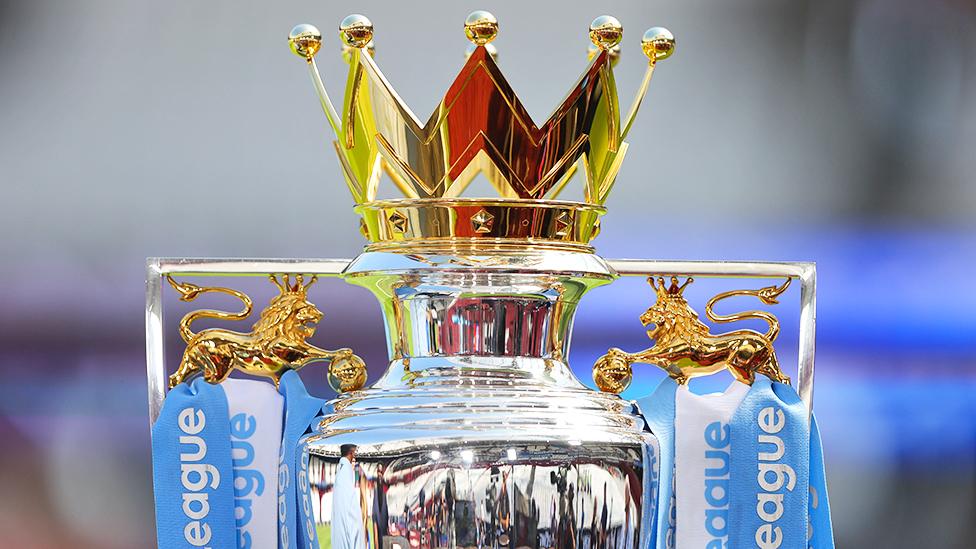Premier League clubs avoided £250m in tax, expert estimate
- Published

Premier League football clubs may have avoided paying £250m in tax over a three-year period, financial experts have estimated.
It follows analysis looking at how football agents are often paid to represent both players and clubs in negotiations, including transfers.
Tax Policy Associates, which led the analysis, says the practice reduces the amount of tax paid on agent payments.
HM Revenue and Customs said it was investigating "a number of clubs".
We do not know which clubs are being investigated, but the teams thought to have benefitted most from dual representation in the past few years include Manchester City, Manchester United, Arsenal and Chelsea. The clubs all declined to comment.
Dual representation
When footballers move clubs or negotiate a new contract, an agent represents the player involved and seeks the best terms for his or her client.
The agent will then receive a fee, or commission, and the whole transaction will incur tax, including income tax, National Insurance and VAT.
However, tax officials are investigating the use of so-called "dual representation contracts", which sees an agent paid for acting for both the player and the club involved in the deal.
The process is complicated - but when half of the agent's fee is paid by the club, it means that half of the payment avoids tax.
The Tax Policy Associates think tank has estimated the practice is potentially worth tens of millions of pounds a year.
If the agent's fee is picked up solely by the player, it says HMRC can expect to receive around 60% of the total payment in tax.
However, the amount of tax due falls to about 30% of the payment, if the fee is split between the player and the club using dual representation.
Use of the practice has become standard in the sport, with some top flight clubs using it in all of their deals. In 2021, FA data revealed around 68% of Premier League player deals were done through dual representation.

Tax Policy Associates estimates the practice may have saved top players, their agents and their acquiring clubs £81m in 2019, £91m in 2020 and £81m in 2021 - more than £250m over the three years.
In 2021, Tax Policy Associates estimates Manchester City saved £10.9m in tax, followed by Manchester United with £10m and Liverpool with £8.1m. In 2020, the largest beneficiary was Chelsea, saving £12.8m.
All its estimates are based on the assumption that player and club split the agent fee 50:50.
In theory, the FA has rules against an agent acting for both the player and the club. But if all parties provide written consent to use dual representation, the practice is technically allowed.
However, Labour MP Meg Hillier, chair of Parliament's Public Accounts Committee, said she will urge HMRC to look into the Premier League's use of dual representation.
"Guidance that's a bit weak isn't really good enough," she said. "You need to have a real clarity about exactly what the position is so that every club does the same thing. You can't have one club doing it and getting away with it and another not."
£7.6bn economy boost
In April 2021, HMRC issued fresh guidance on the use of dual representation which said it would need clubs to keep evidence that agents are legitimately working for both sides of the contract.
It said fees should not automatically be split 50:50, and should instead reflect the extent the agent represented the club and the player.
HMRC could issue penalties and demands for repayments if it finds that an agent has not legitimately been working for both the player and the club when brokering transfer deals.
But the Association of Football Agents (AFA) said it disputed the think tank's findings, saying there was a "fundamental misunderstanding of how the football transfer market works".
It said: "The AFA's members will continue to work closely with HMRC to ensure that the law and current guidance is followed in the structuring of arrangements with tax consequences, as they always have."
An HMRC spokesperson added: "Dual representation cannot be assumed to be a tax avoidance scheme; its use can be tax compliant.
"However, we carefully scrutinise arrangements between clubs and employees, and we work closely with the football industry to educate and deal with tax risk head on.
"Our actions and the money bought in from this industry speak for themselves. Since 2015, from across all tax areas in the football industry, we've recovered £573m that would otherwise have gone unpaid."
BBC Newsnight approached individual clubs, but each declined to comment.
A Premier League spokesperson said: "We believe that the overall figure suggested here is based on assumptions that do not recognise the individual circumstances of each transaction.
"During the 2019/2020 season Premier League football contributed £7.6bn to the UK economy. In the same season the Premier League and its clubs generated a total tax contribution of £3.6bn to the UK Exchequer, £1.4bn of which was accounted for by Premier League players."